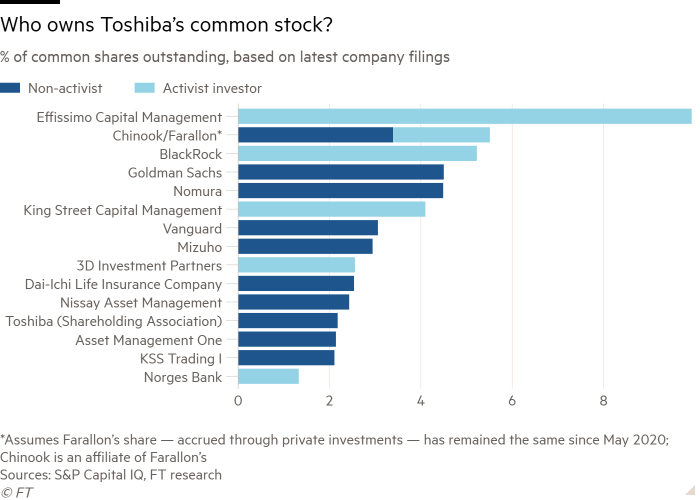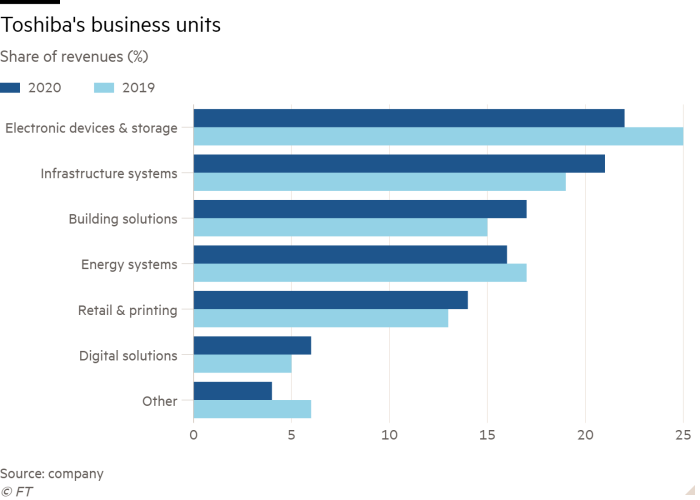Can CVC pull off a $20bn ‘deal of the century’ at Toshiba?

Roula Khalaf, Editor of the FT, selects her favourite stories in this weekly newsletter.
When news leaked on Wednesday that Toshiba was examining a $20bn buyout proposal from European private equity giant CVC, it left many stakeholders stunned. Not least, said people close to CVC, some of the firm’s own executives.
Buying Toshiba, whose chief executive Nobuaki Kurumatani is the former head of CVC’s Japan business, would be the firm’s biggest deal ever, and the largest leveraged buyout in Japan’s history, transforming a market that has slowly warmed to private equity dealmaking but has never had a transaction involving a strategically important household name.
Toshiba’s internal machinations in the week the offer became public, as well as the sheer scale of the proposition and the reaction from the board, have led people close to the company to interpret it as a sign of a much deeper power struggle within the 146-year-old group.
“I have no doubt that CVC’s interest is genuine: there isn’t a private equity house that wouldn’t like to do a deal like this,” said one of the company’s large investors. “The real issue is whether we are hearing about it now because there is a civil war within Toshiba and this is being used by one of the sides as a weapon.”

The sources of tension at Toshiba have recently been in the open for all to see. Just one month ago, its management was defeated during an unprecedented shareholder showdown and forced by activists to initiate a potentially embarrassing investigation of alleged misconduct related to last year’s AGM.
Kurumatani was approaching this year’s AGM at high risk of being voted out, and the company’s largest shareholders believe he was already under pressure to resign.
On the face of it, the CVC proposal for a management buyout that would keep Kurumatani in charge and spare him the scrutiny of activist investors looked like an improbable win for the struggling CEO.

By the end of the week, the shares were 11 per cent higher and the foreign funds who invested in 2018 when the shares were around ¥2,600 ($23) could be expected to sell into an offer above ¥5,000.
Kurumatani, who did a stint at CVC after a long career in banking, would be working with old friends. His closest ally on the Toshiba board, Yoshiaki Fujimori, is an executive adviser to CVC.
Hidetaka Kawakita, a corporate governance expert at Kyoto University, said the timing of CVC’s proposal raised questions particularly considering the company’s long fight to keep its shares listed even as it has faced an accounting scandal and near bankruptcy in the past six years.
“At a time when the focus has been on how many opposition votes Mr Kurumatani will get at the next AGM, it wouldn’t be surprising if retail investors think the company has not been managed well if it accepts the [CVC] proposal and ends up being delisted,” Kawakita said.
CVC and Toshiba declined to comment.
It is not the first time a foreign private equity fund has contemplated a leveraged buyout of Toshiba. According to people close to Toshiba, at least three global firms have submitted non-binding proposals over the past 12 months.
Those approaches have happened, in the words of one private equity executive in Tokyo, because a leveraged buyout of Toshiba would be the deal of the century.
Private equity discovered some years ago that because of the availability of cheap funding and the generally high cash flow of Japanese companies, the returns on deals in Japan were unusually high.

M&A bankers, lawyers and other advisers have long built expectations of a wave of dealmaking, with demand led by private equity groups and helped, in come cases, by geopolitics.
“We are seeing growing outside interest in Japanese technology groups partly as a result of the US-China dispute,” said Kenneth Siegel, head of the M&A team in Japan at law firm Morrison & Foerster.
Others point to signs of softening of the Japanese government’s attitude to foreign investment, citing recent deals such as Chinese technology group Tencent’s acquisition of a 3.6 per cent in ecommerce giant Rakuten.
Jesper Koll, an adviser at WisdomTree Japan, said that there had been a distinct change since the 2019 departure from Japan’s Ministry of Economy, Trade and Industry of Hiroshige Seko, a minister known for a highly protective attitude to “national treasure” companies like Toshiba.
“With him no longer there, it is possible that private equity firms will think that some barriers have fallen,” said Koll.
But while large asset sales to private equity, like Blackstone’s $2.3bn acquisition of Takeda’s consumer healthcare business, have grown more frequent, a sale of Toshiba to a foreign buyer would bring an exceptionally close level of scrutiny by the Japanese government because it is in the highest category of national security-related business.
Citigroup analyst Kota Ezawa said government clearance would likely include specific conditions such as promises to protect nuclear technology as well as the inclusion of a government-backed fund in the CVC-led consortium.
“It is important to create and maintain a management structure that will allow operations to continue on a stable basis,” chief cabinet secretary Katsunobu Kato said.
Within Toshiba, people close to the company say tensions have emerged between Kurumatani and other members of the board following his repeated clashes with activist investors.
In an indication of internal turmoil, Satoshi Tsunakawa, the former CEO, returned to an executive officer position on Wednesday to handle shareholder engagement. Within four days of receiving the CVC proposal, the board’s chair Osamu Nagayama criticised the offer as lacking a “detailed review” of the group’s business.

While the board would carefully study the proposal, he said, it was “completely unsolicited and not initiated by Toshiba by all means”. Scrutinising the financial details would take time, he added.
Another key factor is the valuation of Kioxia, the chip business bought by Bain Capital in 2018 that is still 40 per cent owned by Toshiba.
Having shelved a $3.2bn listing last year because of US-China trade disputes, Kioxia is expected to file for an initial public offering in the coming months. According to people close to the situation, the company is also in discussions to form a three-way alliance with US chipmakers Western Digital and Micron to compete against industry leader SK Hynix, which last year agreed to buy Intel’s NAND memory business for $9bn.
The US-Japan chip tie-up is unlikely to be a full merger, one of the people said, citing the risk of the deal being blocked by Chinese antitrust regulators. Kioxia said there was no change to its IPO plans. Western Digital and Micron declined to comment.

Irrespective of the tie-up, analysts say Kioxia’s valuation will be significantly higher than the $20bn it sought last year, in light of surging chip demand during the pandemic. Depending on Kioxia’s valuation, there is likely to be investor pressure for CVC to increase its offer of ¥5,000 a share.
Already, some big investors argue that Toshiba, which is now worth $18bn, should be valued as high as $27bn or ¥6,600 per share. Any rival bids could also put pressure on CVC to increase its offer.
If CVC does manage this largest ever deal, it would be out of character for a firm that tends to buy companies worth up to €5bn, typically injecting between €200m and €1bn in equity, according to documents shared with potential investors. In Asia, it generally invests in smaller companies still, focusing on those worth up to $1.5bn.
Nagayama said CVC would “seek financing assistance from certain co-investors and financial institutions”, though it is unclear how much of its own equity it could inject. The firm has $4.3bn in a fund for Asian deals, less than a quarter of Toshiba’s price tag.
It has €21bn in a separate “Europe and the Americas” fund, though it is constrained by legal limits that prevent it from investing more than 12.5 per cent of this fund outside those regions.
Private equity deals of this size often involve several buyout groups and additional money from investors such as pension funds and sovereign wealth funds. However “club deals” of this sort are not typical of CVC.
“To do a massive equity syndication like that, it’s not hugely CVC,” said one person who has advised the group. According to another who has worked with the firm: “CVC doesn’t have a long track record of teaming up with other people.”
Comments